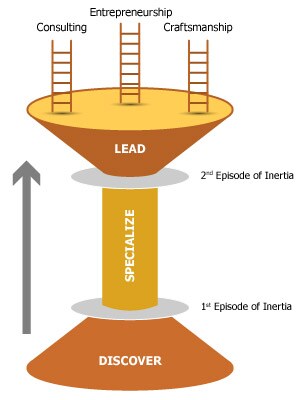Tips to become a specialist and a pro at what you do
Here's a possible framework to stay true to one's core competency and at the same time grow in the corporate world


Many of us have traversed similar career paths in an IT services organisation. From being developers to team leaders to project managers and then to higher managerial roles, until, a day arrives when we realise we are far removed from our core competency, from what we are good at and enjoy doing. While there could be several reasons for this, the underlying cause could be attributed to our inability to identify areas of interest and/or the lack of perseverance to pursue that area.
The purpose of this blog is to share my thoughts on a possible framework to stay true to one’s core competency and at the same time grow in the corporate world.
Look at your career as progressing through a corporate hourglass (see figure). You start your career at the bottom, wet behind the ears, and come out at the top of the hourglass, a veteran. These are the three phases in a specialist’s career, with an episode of inertia between each. I will explain further.
Discover
The first few years of one’s career, typically 3-5 years, should be spent discovering the career and specialisation options available. The subjects that we thought were ‘cool’ in college may not seem so in the corporate world and one should avoid rigid leanings towards a particular area of specialisation. Chasing varied experiences regardless of location or type of work, and working with new people, helps us build an understanding about how the company/industry functions and our options. The goal is to find a field of work that excites you and benefits the company as well. One may reason that the organisation does not offer diverse projects ever so often, but the experiences that I am talking about need not stem from different projects. Do not wait for the organisation to give you varied opportunities, create them yourself. If you contribute in as many different ways, help other people and teams, share and learn from others, and if you are open to different tasks, more opportunities will come your way.
You will reach a point when you have gathered experiences and really enjoy what you are doing. Unfortunately, this is also the time when one comes across challenges, what I refer to as the First Episode of Inertia. These hurdles come in different forms – you may have formed a deep comfort level with the team that you work with and your location despite lack of opportunities to specialise, or there may be the case of a reluctant boss who will not let you go and is also willing to give you a team lead role with a great pay hike, or you may have an offer from another company with a better pay package. This is the time to be more focussed and assertive, to make your preference known, and to move to an area of specialisation that you want to pursue.
Specialise
When you have taken up an area of interest, at least the next 7 to 10 years should be spent carving your niche in that area. It means diving into the minutest details, learning not just on the job but also from like-minded people outside the organisation, and participating in technology or industry or academic forums. This phase is not just about getting exposure to multiple areas or about the number of people one may manage or one’s revenue targets, but also about learning, becoming the best at something and creating a unique identity.
And when you are recognised as a specialist, after having spent years in a field of work, you can choose to continue what you are doing or aspire to make a bigger impact. These individuals need to overcome the Second Episode of Inertia. When you become so good at what you do, you will be recognised in your domain, have a stable career and may even develop a sense of indispensability, such that you don’t want to do anything else! The financial benefits at this stage may be very good, but if it is a new challenge and further growth that you need, you must not hesitate to step out of your comfort zone again, for the sake of growth.
Lead
To create a bigger impact one needs to lead by going beyond individual contributions and push oneself to further expand the horizon of experience. It is important to retain our specialist skills while honing other skills that may lead to opportunities in leadership roles. The specialisation remains one’s core competency, adds credibility and forms the distinguishing character of one’s team and organisation. There are three classes of roles a specialist leader can pursue - Consulting, Entrepreneurship and Craftsmanship, which I will elaborate on, in my next blog.
Specialisation keeps us relevant, and provides more personal satisfaction and professional growth, than most of us would imagine. Every organisation needs more and more such people, who can add a unique specialist character to enable it to achieve the next phase of growth. Consider this framework when you are to make your next big career decision, and I’m confident it will help you start, stay and succeed as a specialist.
- Subbi Lakshmanan is a Vice President in the ENU (Energy, Natural Resources & Utilities) business unit of Wipro Limited.
First Published: Jul 22, 2016, 06:06
Subscribe Now